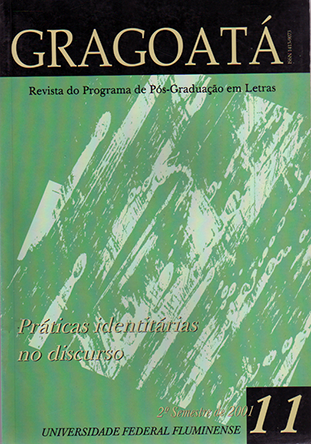A noção de "negociação" em análise de conversação: o exemplo das negociações de identidade
Palavras-chave:
conversação, negociação, interação verbal.Resumo
A análise da conversação, e, mais geralmente, das interações verbais de todos os gêneros, é uma forma de análise do discurso cuja especificidade é que ela se interessa exclusivamente pelos discursos dialogados, encarados como construções coletivas. Mas, para que os participantes possam construir esse texto coletivo que é a conversação, é necessário que se estabeleça entre eles um certo número de acordos sobre o conjunto de regras do jogo conversacional - acordos que, na medida em que não são estabelecidos espontaneamente entre os interlocutores, vão se tornar objeto de negociação, explícita ou implícita, entre os interagentes durante o desenrolar da interação. A noção de negociação é portanto central nessa perspectiva, uma vez que todos os aspectos do funcionamento das interações podem se prestar à negociação, como será mostrado inicialmente através da análise de uma pequena amostra de diálogo. Em seguida, será observado um tipo particular de negociação: a negociação em torno da identidade dos participantes presentes. Será salientado o esquema geral que serve de base ao funcionamento dessas negociações, que será ilustrado em seguida com alguns exemplos extraídos de diálogos tanto ficcionais (diálogo teatral) quanto autênticos (debates eleitorais pela televisão).
Tradução de Fernando Afonso de Almeida
Downloads
Downloads
Publicado
Edição
Seção
Licença
AUTORIZAÇÃO
Autores que publicam em Gragoatá concordam com os seguintes termos:
Os autores mantêm os direitos e cedem à revista o direito à primeira publicação, simultaneamente submetido a uma licença Creative Commons Atribuição 4.0 Internacional (CC BY 4.0), que permite o compartilhamento por terceiros com a devida menção ao autor e à primeira publicação pela Gragoatá.
Os autores podem entrar em acordos contratuais adicionais e separados para a distribuição não exclusiva da versão publicada da obra (por exemplo, postá-la em um repositório institucional ou publicá-la em um livro), com o reconhecimento de sua publicação inicial na Gragoatá.
A Gragoatá utiliza uma Licença Creative Commons - Atribuição CC BY 4.0 Internacional.











